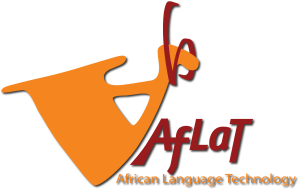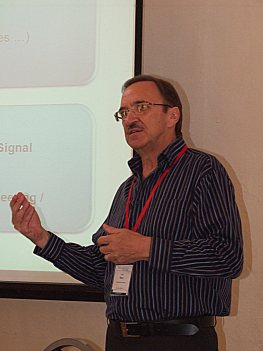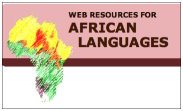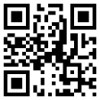Southern Africa
PRASA/AfLaT/RobMech - First call for Papers
Submitted by Guy on Thu, 2014-08-28 14:31Submission deadline extended until 29/9!!!
FIRST CALL FOR PAPERS For the Joint conference of
25th annual symposium of the Pattern Recognition Association of South Africa (PRASA)
6th Workshop on African Language Technology (AfLaT)
7th conference of Robotics and Mechatronics (RobMech)
in Cape Town on
27 and 28 November 2014
The 25th annual symposium of the Pattern Recognition Association of South Africa (PRASA) will be held in conjunction with the 6th Workshop on African Language Technology (AfLaT) and the 7th conference of Robotics and Mechatronics (RobMech) on 27 and 28 November 2014 at the Lagoon Beach Hotel in Cape Town (https://www.lagoonbeachhotel.co.za).
CORPUS WEEK at Rhodes University, Grahamstown, South Africa 25 - 28 March 2013
Submitted by Guy on Wed, 2013-02-13 12:07Corpus Linguistics "in the very very South"
We are pleased to announce the first in a series of annual meetings intended to draw together researchers in Southern Africa and beyond who work with corpora - or who would like to! A blend of conference presentations, networking sessions and training workshops, Corpus Week is aimed at sharing experience and expertise, as well as inspiring researchers from diverse areas of linguistics and other disciplines to see the potential for incorporating corpus methods in their work.
Expressions of interest in getting involved are now invited - whether you would like to offer a training workshop, present corpus research or just come and meet like-minded researchers, you would be very welcome. The meeting will offer something for everyone, from the experienced researcher to the intrigued newbie.
Confirmed contributors:
Bertus van Rooy
Danie Prinsloo
Ramesh Krishnamurthy
Sylvia Jaworska
For more information or to submit your expression of interest, please
contact Sally Hunt at S [dot] Hunt [at] ru [dot] ac [dot] za or +27 46 603 8105.
Dr Sally Hunt
Department of English Language and Linguistics
Rhodes University
Grahamstown
South Africa
Tel: +27 46 6038105
- Login to post comments
CMUSphinx4 Speech recognition toolkit
Submitted by Shadrack on Tue, 2012-12-18 10:18This is one of the appropriate tools to work on if interested in building a speech recognizer, challenges though few include building a corpus for the dialect chosen.I attained 72% recognition on a set of isolated utterances in swahili dialect. If in need of assistance with the tool, Ill be glad to help.
Shadrack
- Login to post comments
Zulu Part-of-Speech Tagger - Demo
Submitted by Guy on Fri, 2012-03-30 06:58This demo showcases a part-of-speech tagger for Zulu. It retrieves the morpho-syntactic categories for words in a sentence.
Type in the text you want to tag
Example: Indawo encane ihlupha ngakho khona lokho.
The data used to build this part-of-speech tagger can be found through this link.
- Login to post comments
Third Workshop on African Language Technology (AfLaT 2011) - Report
Submitted by Guy on Fri, 2011-12-09 08:43| AfLaT2011, the Third Workshop on African Language Technology, was organized as a breakout session of the AGIS11 conference (Action Week for Global Information Sharing) in Addis Ababa, Ethiopia. It marked the first time an AfLaT workshop took place on the African continent. AfLaT2011 featured ten presentations on a variety of topics and languages. We want to thank the presenters and participants for their contributions to the workshop, as well as the organizers of AGIS11 to allow us to collocate the AfLaT workshop with their wonderful conference. | 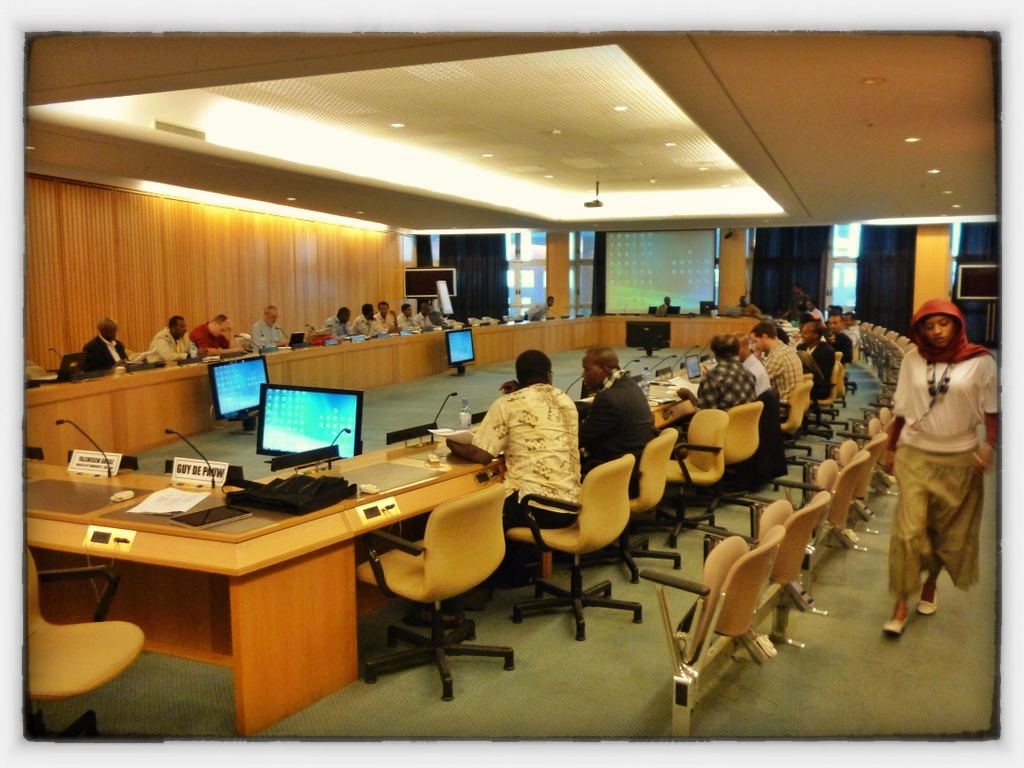 |
Zulu Part-of-Speech Tagging Demo - Output
Submitted by Guy on Thu, 2011-09-22 20:36- Login to post comments
Second Workshop on African Language Technology (AfLaT 2010) - Report
Submitted by Guy on Thu, 2010-08-05 08:33The ZULU Competition
Submitted by Guy on Thu, 2010-01-07 08:24https://labh-curien.univ-st-etienne.fr/zulu/
Supported by Pascal 2 Network of Excellence
Abstract:
Zulu is an active learning competition. Participants are to build algorithms that can learn deterministic finite automata (DFA) by making the smallest number of membership queries to the server/oracle.
Motivations:
When learning language models, techniques usually make use of huge corpora that are unavailable in many less resourced languages (such as the Zulu language). One possible way around this problem is to interrogate an expert with a number of chosen queries, in an interactive mode, until a satisfying language model is reached. In this case, an important indicator of success is the amount of energy the expert has spent in order for
learning to be successful. A nice learning paradigm covering this situation is that of Query Learning, introduced by Dana Angluin.
In the field of Grammatical Inference, Query Learning was thoroughly investigated to learn deterministic finite automata (DFA). As negative results, it was proved that DFA could not be learned from just a polynomial number of membership queries nor from just a polynomial number of strong equivalence queries. On the other hand, algorithm L* designed by Angluin, was proved to learn DFA from a polynomial number of both membership and equivalence queries. These results yield several successfull applications in Robotics, Games and Agents Technologies, Information Retrieval, Hardware and Software Verification.
However, what has not been hardly studied is how to optimise the learning task by trying to minimize the number of queries while making queries for which the Oracle's work and answers are simple. These are strong motivations for stemming research in the direction of developing new interactive learning strategies and algorithms, that is the aim of this competition.
The competition:
Zulu (https://labh-curien.univ-st-etienne.fr/zulu/) is both a web based platform simulating an Oracle in a DFA learning task and a competition.
As a web platform, Zulu allows users to generate tasks, to interact with the Oracle in learning sessions and to record the results of the users. It provides the users with a baseline algorithm written in JAVA, or the elements allowing to build from scratch a new learning algorithm capable of interacting with the server.
The server can be accessed by any user/learner who has opened an account. The server acts as an Oracle for membership queries. A player can log inand ask for a target DFA. The server then computes how many queries itneeds to learn a reasonable machine (reasonable means less than 30% classification errors), and invites the player to interact in a learning session in which he can ask up to that number of queries.
At the end of the learning process the server gives the learner a set of unlabelled strings (a test set). The labels the learner submits are used to compute his score.
As a starting point the baseline algorithm, which is a simple variation of L*, with some sampling done to simulate equivalence queries, is given to the user, who can therefore play with some simple JAVA code for a start.
The competition itself will be held in the spring of 2010 and the results will be presented during a special session at the International Colloquium on Grammatical Inference in Valencia, Spain, September 13-16, 2010(https://users.dsic.upv.es/workshops/icgi2010/)
Schedule:
- from now to March 1st, 2010: Zulu platform is open, anyone may
register and have fun
- March 1st: Official beginning of the competition
- May 15th: Deadline for scoring, submissions closed
- June 1st: Notifications of the results
- June 20th: Deadline for submission of abstracts explaining participants strategies
- September 13-16th: workshop at ICGI
Prizes and publications:
The winner of the Zulu competition will receive a prize, to be announced
on the Zulu webpage. Participants are encouraged to present their
innovations either as full papers to the ICGI 2010 conference, or as
extended abstracts to the Zulu workshop that will be organised during
ICGI. A journal special issue will also be considered.
Scientific committee:
* Dana Angluin, Yale University, USA
* Leo Becerra Bonache, Universidad de Tarragona, Spain
* François Coste, IRISA, Rennes, France
* Alex Clark, Royal Holloway University of London, UK
* Ricard Gavalda, Universidad Politecnica de Barcelona, Spain
* Colin de la Higuera, University of Nantes, France
* Jean-Christophe Janodet, University of Lyon, France
* Aurelien Lemay, University of Lille, France
* Laurent Miclet, ENSAT Lannion and IRISA, France
* Tim Oates, University of Maryland, USA
* Anssi Yli Jyra, University of Helsinki, Finland
* Menno van Zaanen, Tilburg University, The Netherlands
- Login to post comments
Newsletter October 2009
Submitted by Guy on Mon, 2009-10-19 14:48Dear AfLaT member,
we would like to draw your attention to some recent highlights in African Language Technology.
(1) Google announced the availability of their Swahili Machine Translation system
https://aflat.org/?q=node/346
(2) CALL FOR ABSTRACTS for the National Human Language Technology Network Day 2010
https://aflat.org/?q=node/345
(3) MURI Call for White Papers: "Structured Modeling for Low-Density Languages"
https://aflat.org/?q=node/347
Also several new publications and links have recently been added. We hope to see you soon at https://AfLaT.org!
with kind regards
the AfLaT team
- Login to post comments
